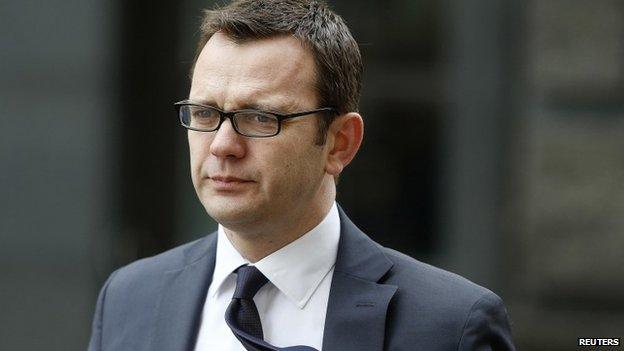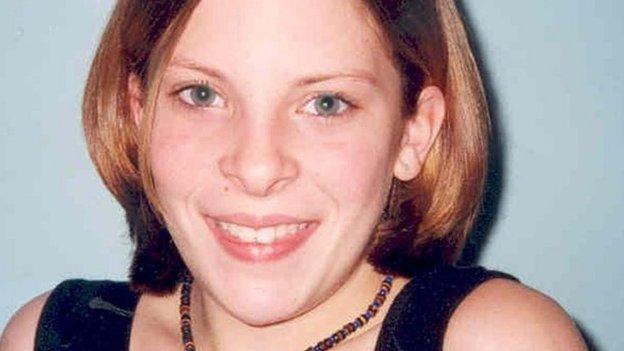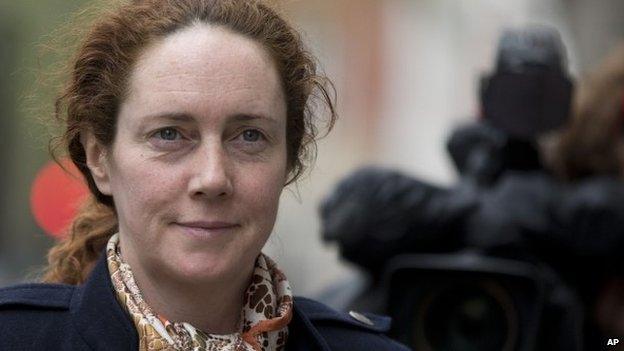Coulson 'may not have read' all of Milly Dowler story
- Published

Mr Coulson denied refusing to speak to police because he hoped they would not be able to prove anything
Former News of the World editor Andy Coulson has told the phone-hacking trial he may not have read all of a key story about missing schoolgirl Milly Dowler published in April 2002.
Under cross-examination, he said he thought the story, which suggested the schoolgirl was alive and looking for a job, was nonsense.
The story was obtained by hacking Milly's mobile phone.
Mr Coulson, 46, of Charing, Kent, denies conspiring to hack phones.
He also denies a second charge of conspiring to commit misconduct in a public office.
In court on Friday, Mr Coulson denied refusing to speak to police when he was arrested in July 2011 because he hoped they would not be able to prove his involvement in illegal phone hacking.
"I gave a no comment interview to the police on legal advice," he said.
Mr Coulson also rejected suggestions by the prosecution that there had been a "process of hiding the true source" in relation to the Milly Dowler story.

Mr Coulson said he had probably moved the story about Milly Dowler but denied trying to hide its source.
The story was originally published on page nine of the News of the World but in a later edition appeared on page 30 with the quotes, which had been obtained from the schoolgirl's voicemail, removed.
Mr Coulson said the story's prominent position in early editions was a "mistake" and it was moved to redraw the balance of the paper.
"I accept that it was moved and I accept it was quite likely I was responsible for that," he said.
'Bad mistake'
The former editor denied he had "turned a blind eye" to phone hacking at the News of the World.
He was again asked why he had not enquired how the paper's then chief reporter, Neville Thurlbeck, had obtained a voicemail left by the then home secretary, David Blunkett, for his lover.
Mr Coulson said: "I accept that I failed. I don't think I turned a blind eye - to turn a blind eye you would have to have some knowledge.
"What I'm saying is it was a mistake, a bad mistake."

Mr Coulson said his affair with Rebekah Brooks continued until 2007
Mr Coulson has previously told the jury it was only later that he came to know the message was obtained through phone hacking, and this was the single instance he heard about the activity during his editorship.
Andrew Edis QC, prosecuting, said: "The evidence you knew about the hacking of Mr Blunkett... is overwhelming so you had to make the admission."
Mr Coulson said: "No. I have chosen to explain what happened in relation to Mr Blunkett."
He was also questioned about why, after his arrest, he never told police his version of events about stories on Mr Blunkett and Milly Dowler which came from hacking.
Mr Edis said: "What you intended to achieve by this - you avoided making any admission about David Blunkett and Milly Dowler, hoping they would never be able to prove it."
Mr Coulson said he had acted on the advice of his solicitor.
Payoff
Earlier, the jury at the Old Bailey heard that Mr Coulson's affair with his former boss Rebekah Brooks went on for longer than has previously been suggested.
The court has already heard their relationship started in 1998 and Mrs Brooks wrote a letter to him in 2004 because he had broken it off.
But Mr Coulson said: "The affair did continue until around the time I left the News of the World" in 2007.
The jury also heard that Mr Coulson had received a payoff of £600,000 when he resigned from the paper in January 2007.
He said the deal entailed two years' pay plus a month for every year served.
"I did not consider that unusual," he said.
Notebooks
In other exchanges, Mr Coulson was asked repeatedly where his notebooks were from his time as editor. He said if he had kept them, they would be available.
Mr Edis said: "There isn't a single note in existence of yours from your time at the News of the World regarding things we are discussing this morning. How does that come about?"
Mr Coulson replied: "Well I certainly haven't behaved in an inappropriate way on that front in any way."
He was also asked why he got an assistant to print off all his emails in 2006 shortly before his former royal editor at the paper, Clive Goodman, pleaded guilty to phone hacking.
When asked if that was because he was going to delete them, he replied: "No."
The emails were delivered to Mr Coulson's solicitor, protected by legal privilege, and the prosecution has not had access to them.
The case continues.